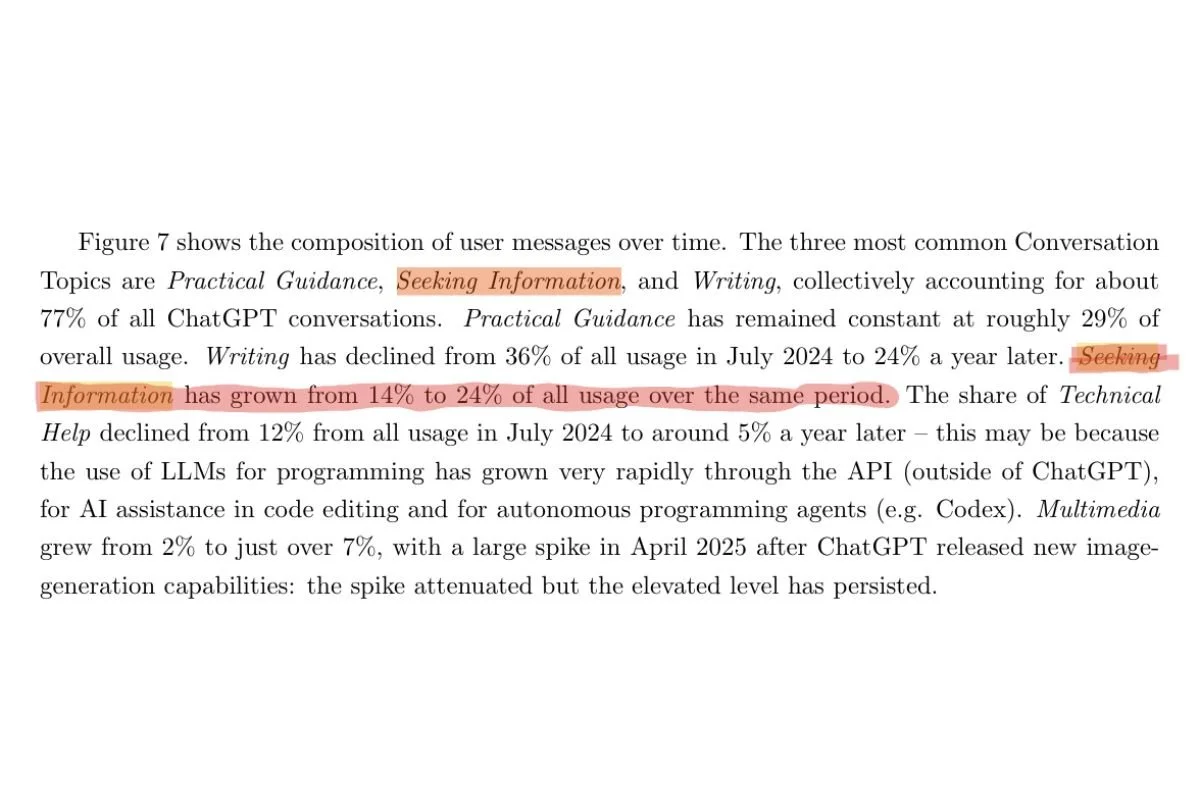Google’s Out. ChatGPT Is the New Search Bar.
OpenAI just released a study on how people use ChatGPT, and the results are a wake-up call for every business.
The results show how AI tools dramatically affect how customers discover you, how they evaluate your brand, and how they decide to buy.
For years, SEO has followed where people search. That used to mean chasing Google’s algorithm. Today, it means preparing for AI assistants.
According to Search Engine Journal (SEJ), mass adoption of ChatGPT is expected to surge between December 2025 and August 2026.
If your brand wants to stay visible, you need to be AI-Search Ready, not just optimized for Google.
And, like the SEJ article stresses, we don’t have years to prepare; we have months.
Search Behavior Has Moved Inside ChatGPT
The OpenAI study found that “Seeking Information” queries grew from 14% to 24% of usage in just one year.
That’s not casual chit-chat—it’s people searching for products, people, and current events directly inside ChatGPT instead of Google.
And the line between search and purchase is disappearing. OpenAI recently announced a feature that lets users buy directly inside ChatGPT.
That means the same place customers discover you could be the place they transact, with zero clicks to your website.
Implication: Page-one rankings no longer guarantee visibility. If AI assistants don’t surface your brand, you’re not even in the conversation.
Why AI Assistants Win Over Google
Why are users shifting away from search engines?
Because AI assistants deliver what Google can’t: fast, synthesized, personalized answers.
Instead of scrolling through 10 links and having to synthesize the answer to your question on your own, users get a clear, single answer. Instead of a generic fitness blog, they get a custom workout plan tailored to their goals.
And here’s the bigger picture: ChatGPT currently controls nearly 60% of the AI assistant market, with ~400 million monthly active users: four to five times larger than its nearest competitors (Gemini, Perplexity, Claude).
And don’t forget that Bing Copilot adds another 14% to that number.
That concentration means that if you’re not visible in ChatGPT, you’re missing out on where the majority of AI-driven discovery is happening.
Implication: Winning visibility inside ChatGPT isn’t optional; IT’S CRITICAL.
What This Means for SEO (And Why SEO Alone Isn’t Enough)
The traditional SEO levers (backlinks, keyword stuffing, directory listings) don’t determine AI visibility.
What matters now:
Structure: Schema markup, answer-first formatting, clarity.
Authority: E-E-A-T signals, brand mentions, expert authorship.
Depth: Content assets AI trusts: case studies, benchmarks, calculators, proprietary data.
Implication: SEO is now just one piece of a larger discipline: AI-Search Readiness.
Content Strategy for AI-Search Readiness
How do you build content that AI tools can actually cite?
Lead with answers. Place the summary at the top, followed by the details.
Decision-support content. Help users make choices, not just consume facts.
Visibility assets. Research reports, ROI calculators, benchmarks; things AI trusts.
Cross-channel consistency. Ensure your brand is consistent and coherent across your website, LinkedIn, YouTube, and PR materials.
What to Do Next
The future of visibility isn’t ten blue links, it’s AI-generated answers.
To prepare:
Audit your visibility. Do ChatGPT, Gemini, or Perplexity cite you today?
Identify gaps. Weak author bios, thin authority signals, or missing structured content all hurt visibility.
Build your roadmap. Map out a 30/60/90-day plan to strengthen your authority and AI readiness.
What This Means for Your Brand
OpenAI’s own research confirms the shift: AI assistants are where people now search, evaluate, and increasingly buy. If you’re still only optimizing for Google, you’re already behind.
The brands that win tomorrow will be the ones that AI tools recognize as authoritative today.
🟣 That’s why we built the AI-Search Readiness Audit. It shows you where you stand, where you’re weak, and what to fix first so your brand isn’t left invisible in the AI era.

